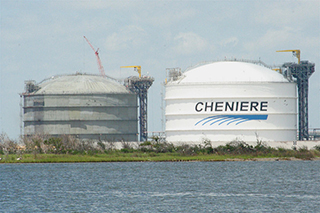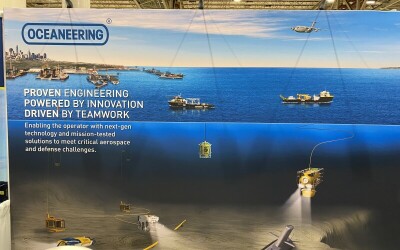(Bloomberg) — Cheniere Energy Inc., which in February became the first to export shale gas from the U.S., has tapped former Calpine Corp. Chief Executive Officer Jack Fusco to lead the company, effective immediately. Cheniere rose the most since February.
Fusco is replacing Neal Shear, a former head of Morgan Stanley’s commodities division, Cheniere said in a statement Thursday. Shear became Cheniere’s interim CEO after the company ousted its founder, Charif Souki, in December. Fusco was CEO of Houston-based power generator Calpine from August 2008 to May 2014 and served as executive chairman of the company’s board through Wednesday, regulatory filings show.
Fusco’s target compensation for 2016 will be about $9 million, including a $1.25 million salary, $1.56 million target bonus and $6.25 million long-term incentive that will pay out over three years, according to a filing Thursday. Souki made $54 million in his last year at Cheniere, a seven-fold increase from 2014 thanks almost entirely to cash tied to the company’s stock and other incentives. Fusco also received new-hire equity awards worth at least $5 million and will get 30 days of paid vacation. He has agreed to buy $10 million worth of Cheniere stock by Dec. 31.
“Bringing in a guy like Jack makes a lot of sense,” John Bartlett, who helps manage about $2.5 billion of energy and utility stocks at W.H. Reaves & Co Inc in Jersey City, New Jersey, said by phone Thursday. “His key mission is going to be executing their business plan.”
Souki was fired for what he described as a disagreement over the company’s strategy. After his departure, Cheniere scaled back its capital spending plans to about $30 billion from more than $50 billion. Billionaire investor Carl Icahn, Cheniere’s biggest shareholder, told CNBC in an interview last month that he played an “instrumental” role in his termination, adding that Souki had “ harebrained ideas.” The exporter’s stock has plunged by about 54% in the past year, weighed down by the collapse in oil prices.
Hiring Fusco is “a great step in the right direction,” Icahn said in a tweet.
Cheniere rose 5.9% to $34.66 at 12:14 p.m. in New York after earlier gaining 8.7%, the most since Feb. 24.
‘Huge Challenge’
“Unfortunately, in the last six months, the company has wasted some time in terms of implementing the transition from a development company to an operational company,” Souki said by telephone Thursday. Fusco “has a huge challenge. Everybody says he is a good guy, very nuts-and-bolts oriented, which is presumably what the company wants in terms of the new direction.”
Fusco’s compensation at Calpine totaled $1.53 million last year, a regulatory filing shows. That included a salary of $675,658. He stepped down as CEO of Calpine “as part of a planned leadership transition,” the company said in a Nov. 7, 2013, statement.
Before joining Calpine, Fusco was CEO of Texas Genco LLC, an independent power company and was an energy investment adviser before that, according to Calpine’s website.
“Our priorities will be focused on continued execution and completion of the LNG trains, both under construction and under development, and further commercialization of our LNG portfolio," Fusco said in the statement.
Houston-based Cheniere became the first company to export a cargo of liquefied natural gas from America’s shale formations in February, sending its first tanker from its Sabine Pass terminal in Louisiana to Brazil. The company is building seven liquefaction plants, that chill gas to compress it for shipment on tankers by sea. Once online, the plants will generate about $4.3 billion annually in fixed fees through 20-year contracts, Cheniere said in a filing.
Fusco needs to complete construction of Cheniere’s export equipment on budget and if possible ahead of schedule, Brian Kessens, who helps manage $14.1 billion of energy stocks including Cheniere at Tortoise Capital Advisors LLC in Leawood, Kan., said by phone Thursday.
“They want him to maximize shareholder value from their current set of assets, which is a great set of assets given the contracts they have with investment-grade counterparties over the next 20 to 30 years,” Kessens said. “He’s familiar with hedging, and the kind of risk parameters that need to be put in place.”





